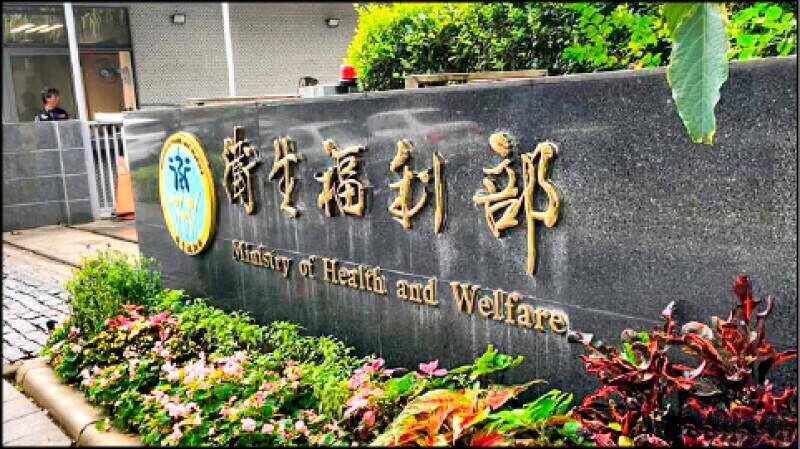The eligibility for National Health Insurance (NHI)-covered spinal muscular atrophy (SMA) treatment would be expanded starting today, and is expected to cover about 90 percent of people with SMA, the Ministry of Health and Welfare said yesterday.
About 400 people in Taiwan have SMA, a rare genetic disease affecting motor neurons, nerve cells mainly in the spinal cord that control voluntary muscle movement. The disease causes progressive weakness and atrophying of muscles.
People with SMA, their families and pharmaceutical companies had urged the National Health Insurance Administration (NHIA) to expand the eligibility of the NHI’s coverage of SMA treatments to all affected.

Photo: Lin Chih-yi, Taipei Times
The health ministry in early March announced that it would ease restrictions for receiving NHI-covered SMA treatments this year, adding that the policy would commemorate the late human rights lawyer Chen Chun-han (陳俊翰), who had SMA and advocated for SMA patients’ right to affordable treatment. He died in February.
Three types of medicines are primarily used to treat SMA, including an intrathecal injection into the spine every few months, a daily oral medication and a one-time gene therapy treatment.
NHIA Medical Review and Pharmaceutical Benefits Division head Huang Yu-wen (黃育文) yesterday said the change in eligibility is for the spinal injection and the oral medication, which had similar eligibility criteria.
The eligibility has been expanded to include people who experienced the onset of symptoms at age 18 or younger, removes the requirement of Revised Upper Limb Module assessment score of 15 or higher and allows people to change their medication once if they have an intolerance to a drug, Huang said.
People with SMA can choose between a spinal injection or oral medication covered by the NHI, but considering the possibility of drug intolerance, they can switch to the other type once in their lifetime, she said.
Under the previous eligibility, only about 140 of the affected people in Taiwan met the criteria for NHI-covered spinal injection or oral medication, but the expanded eligibility is expected to cover treatment for about 250 more people.
The estimated medical expense for the policy in the first year would be about NT$2 billion (US$60.91 million) — an average of NT$6.6 million per patient per year.
Meanwhile, the health ministry earlier this month announced that it would expand a government-funded mental health counseling program, offering three free counseling sessions to people aged 15 to 30.
The program, launched in August last year, would be from today available to people aged 15 to 45.
In addition, starting today, a prescription drug refill limit would be expanded for crew members of long-distance fishing or international shipping vessels, whose chronic disease condition is stable, receive the same prescription drugs each refill and are also scheduled to leave within a month for maritime work for 90 days or longer, the ministry said.
The crew members would be allowed to refill their prescription drug for chronic disease for up to 180 days, and refills of prescription drugs for more than 180 days would also be allowed for special circumstances approved by the NHIA.

A relatively large earthquake may strike within the next two weeks, following a magnitude 5.2 temblor that shook Taitung County this morning, the Central Weather Administration (CWA) said. An earthquake struck at 8:18am today 10.2km west of Taitung County Hall in Taitung City at a relatively shallow depth of 6.5km, CWA data showed. The largest intensity of 4 was felt in Taitung and Pingtung counties, which received an alert notice, while areas north of Taichung did not feel any shaking, the CWA said. The earthquake was the result of the collision between the Philippine Plate and the Eurasian Plate, the agency said, adding

Snow fell in the mountainous areas of northern, central and eastern Taiwan in the early hours of yesterday, as cold air currents moved south. In the northern municipality of Taoyuan, snow started falling at about 6am in Fusing District (復興), district head Su Tso-hsi (蘇佐璽) said. By 10am, Lalashan National Forest Recreation Area, as well as Hualing (華陵), Sanguang (三光) and Gaoyi (高義) boroughs had seen snowfall, Su said. In central Taiwan, Shei-Pa National Park in Miaoli County and Hehuanshan National Forest Recreation Area in Nantou County saw snowfall of 5cm and 6cm respectively, by 10am, staff at the parks said. It began snowing

HOLIDAY EXERCISE: National forest recreation areas from north to south offer travelers a wide choice of sights to connect with nature and enjoy its benefits Hiking is a good way to improve one’s health, the Forestry and Nature Conservation Agency said, as it released a list of national forest recreation areas that travelers can visit during the Lunar New Year holiday. Taking a green shower of phytoncides in the woods could boost one’s immunity system and metabolism, agency Director-General Lin Hwa-ching (林華慶) cited a Japanese study as saying. For people visiting northern Taiwan, Lin recommended the Dongyanshan National Forest Recreation Area in Taoyuan’s Fusing District (復興). Once an important plantation in the north, Dongyanshan (東眼山) has a number of historic monuments, he said. The area is broadly covered by

Global bodies should stop excluding Taiwan for political reasons, President William Lai (賴清德) told Pope Francis in a letter, adding that he agrees war has no winners. The Vatican is one of only 12 countries to retain formal diplomatic ties with Taiwan, and Taipei has watched with concern efforts by Beijing and the Holy See to improve ties. In October, the Vatican and China extended an accord on the appointment of Catholic bishops in China for four years, pointing to a new level of trust between the two parties. Lai, writing to the pope in response to the pontiff’s message on Jan. 1’s